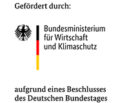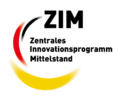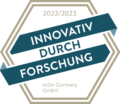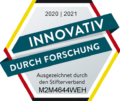

WinOSens - Find instead of search
Project title: Low-maintenance and low-infrastructure object localization using machine learning in embedded sensor systems
Funded by: Federal Ministry of Education and Research (BMBF)
Project partners: TU Hamburg, m2m Germany, osapiens Hub GmbH
Project duration: 07.2021 to 11.2023
The aim of the BMBF-funded research project was to use sensor-based data and machine learning (ML) to investigate the possibilities of indoor tracking of special load carriers. Such a tracking method, in which sensor modules are attached to the objects to be tracked, could be more cost-effective and easier to implement than traditional tracking technologies such as GPS or the installation of other tracking infrastructures.
This low-infrastructure tracking method could be used, for example, for inventory tracking in internal logistics processes and to support enterprise resource planning (ERP) systems.
As part of the project, m2m Germany developed the sensor module with the microcontroller as a demonstrator. This module was equipped with sensors for acceleration, rotation, magnetic field and air pressure, among other things. Instead of using GPS, the sensor data along the paths was to provide information about the respective position of the object based on the change in air pressure during an elevator ride or magnetic field fluctuations caused by metallic structures along the path, such as a metal frame of a door.
The TU Hamburg focused on the topic of machine learning (ML). It investigated various ML models for processing sensor features and calculating the position. It relied on models based on decision trees as well as those based on neural networks. The system was tested in a series of experiments and achieved very good results. It was able to recognize and localize objects with an accuracy of over 98%. Even anomalies in production processes could be detected in this way.
Dr. Marcus Venzke, senior engineer at the Institute of Telematics at the Technical University of Hamburg, presented the project very clearly in a video.
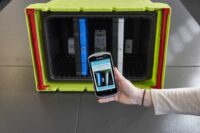
SensoKo - Safe tracking of medicines subject to cold chain requirements during transportation
Project title: Development of a sensor- and cloud-based communication system for special integration into multi-chamber insulated containers for more efficient GDP-compliant process handling in the pharmaceutical industry
Funded by: Federal Ministry of Economics and Climate Protection (BMWK) and ZIM
Project partners: TH Köln, m2m Germany
Project duration: 03.2021 to 02.2023
As part of a two-year research project funded by the Federal Ministry for Economic Affairs and Climate Protection (BMWK) and ZIM, an innovative sensor and cloud-based communication system in the pharmaceutical industry, called sensoKo, was developed.
The main objective was to continuously monitor the transport route of medicines subject to cold chain requirements along the entire supply chain up to delivery to pharmacies, taking GDP (Good Distribution Practice) into account, and to document this as automatically as possible. GDP stands for "Good Distribution Practice" and refers to guidelines for quality assurance of the distribution channel of medicinal products in order to ensure their integrity, quality and efficacy from the manufacturer to the end consumer.
The system to be developed was to replace the previously used data loggers, which not only take up a lot of space in the cooling chambers, but also have to be read out manually - a process that can be both time-consuming and inaccurate. Together with the TH Köln, we have succeeded in developing a transport container system consisting of several insulating chambers with different temperature ranges and integrated sensors. The transfer from one player in the supply chain to the next is documented by a scan using a smartphone app. The temperatures in the containers are continuously monitored in real time. The project also aimed to investigate the extent to which it is possible to intelligently analyze the collected measurement data based on artificial intelligence (AI) in order to detect anomalies, for example.
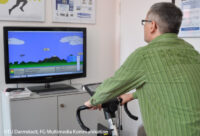
PDExergames - Playful training of motor and cognitive skills in Parkinson's patients
Project title: Development of an exergaming system for testing MIT concepts using the example of Parkinson's disease (PDExergames)
Funded by: Federal Ministry of Education and Research
Project partners: TU Darmstadt, University of Cologne, Ascora, m2m Germany, ProLog, paragon semvox GmbH
Project duration: 03.2017 to 02.2021
PDExergames is an innovative training program for people with Parkinson's disease that aims to improve motor and cognitive skills through playful, computer-based training. Patients train their skills using various scenarios in the form of computer games, with the training units tailored to the specific needs of the users. Therapists and trainees receive real-time feedback so that training performance can be effectively monitored and adjusted. The aim of this project was to support patients whose motor skills are limited, e.g. due to a stroke or diseases such as Parkinson's, in their rehabilitation and to treat deficits in a more targeted manner than in conventional therapies.

